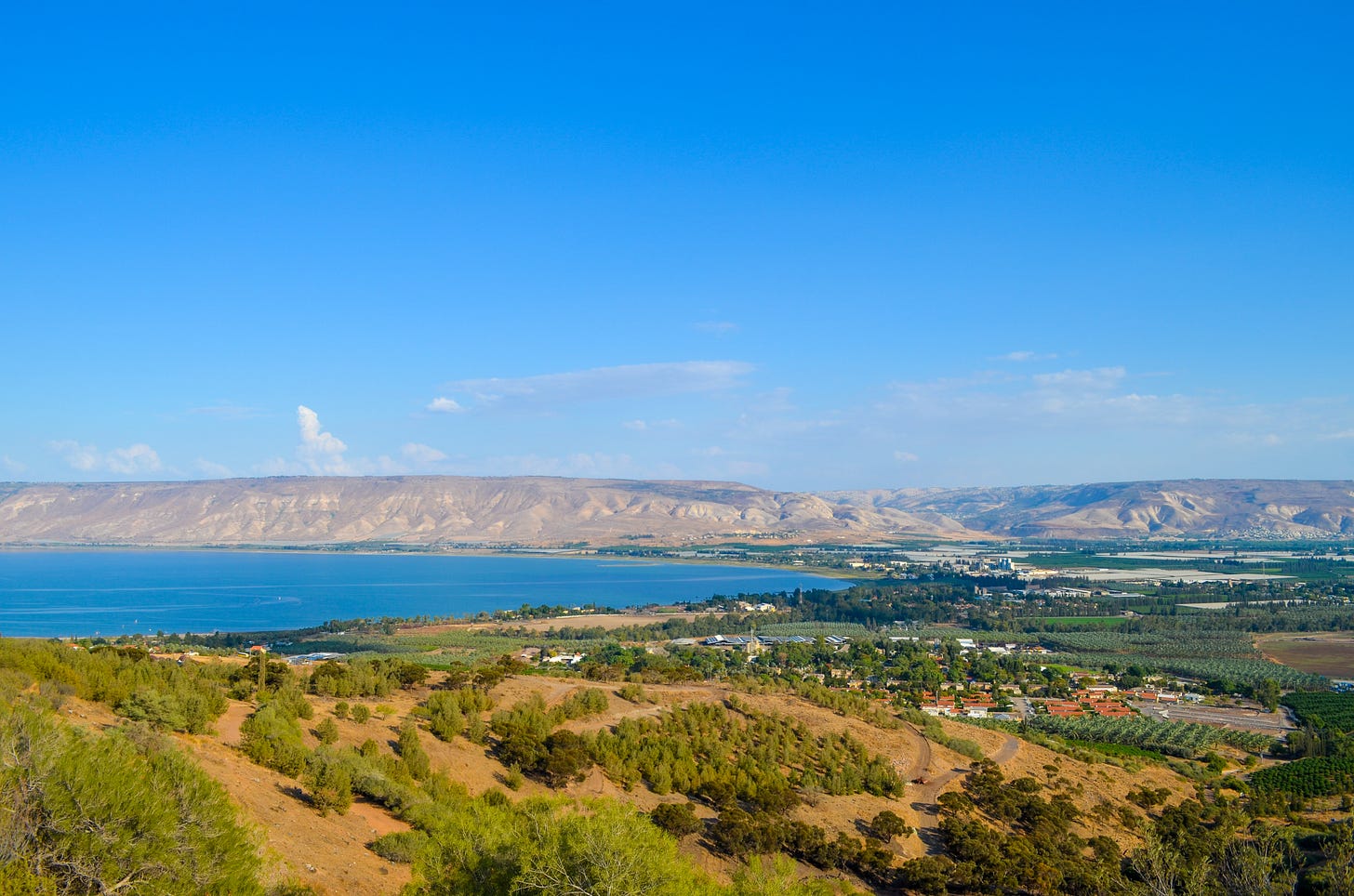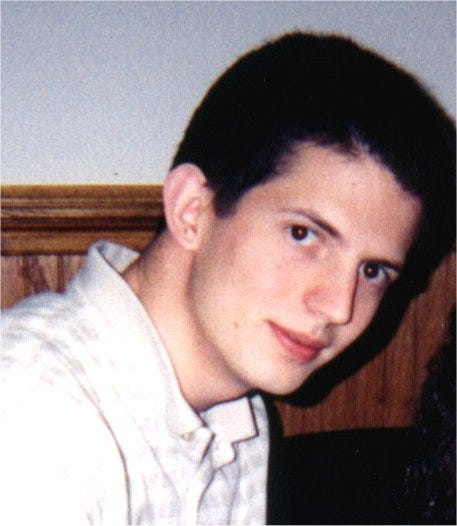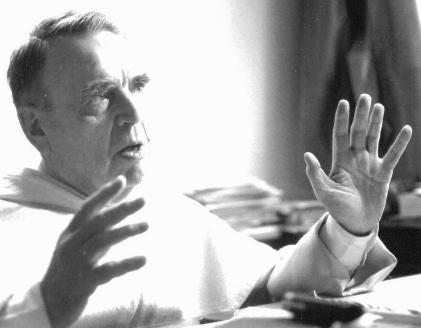Remember Your Own Galilee and Walk Towards It
Reflections on Pope Francis's Easter Vigil Homily
In his homily at the Easter Vigil Mass celebrated at St. Peter’s Basilica this past Saturday, Pope Francis focused on a peculiar aspect of the Gospel reading, from the Gospel of Matthew. Mary Magdalene and another Mary come to Jesus’ tomb the day after the sabbath (we are not told exactly why), and there they encounter an angel. The angel announces to them that Jesus has been raised, and then he tells them, “[G]o quickly and tell his disciples, ‘He has been raised from the dead, and he is going before you to Galilee; there you will see him’” (Mt. 28:7). The two women are given the message that, if the disciples want to experience the risen Jesus, they must go to Galilee.
Then, as the two women go to meet the disciples, Jesus himself appears to them. The Gospel says that they did him homage, and then Jesus gives them a message similar to that of the angel: "Go tell my brothers to go to Galilee, and there they will see me” (v. 10). It is intriguing that the two women experience Jesus then and there, while the disciples must travel to Galilee to encounter him (vv. 16-17). That being said, Francis’s focus is on exploring why this journey to Galilee was necessary for the disciples.
The first reason, according to Francis, is because Galilee, the northern region of Judea, serves as a gateway of sorts to the nations, and it is at his appearance in Galilee that Jesus gives his disciples the commission to “Go, therefore, and make disciples of all nations, baptizing them in the name of the Father, and of the Son, and of the holy Spirit, teaching them to observe all that I have commanded you” (vv. 19-20). As Pope Francis states:
[To go to Galilee means] to leave the enclosure of the Upper Room and go to the land of the Gentiles (cf. Mt 4:15), to come forth from hiding and to open themselves up to mission, to leave fear behind and to set out for the future.
The second reason, however, is Francis’s main focus. He suggests that Jesus wants his disciples to return to Galilee because that is where they first encountered him and where their faith was first kindled.
[It means] to return to the origins, for it was precisely in Galilee that everything began. There the Lord had met and first called the disciples. So, to go to Galilee means to return to the grace of the beginnings, to regain the memory that regenerates hope, the “memory of the future” bestowed on us by the Risen One.

He goes on to preach that this “return to the grace of the beginnings” is something every baptized Christian sould experience at Easter, along with the renewal of the baptismal vows. Throughout our lives, we experience moments where we live among the tombs:
At times, we may simply feel weary about our daily routine, tired of taking risks in a cold, hard world where only the clever and the strong seem to get ahead. At other times, we may feel helpless and discouraged before the power of evil, the conflicts that tear relationships apart, the attitudes of calculation and indifference that seem to prevail in society, the cancer of corruption--there is so much--the spread of injustice, the icy winds of war. Then too, we may have come face to face with death, because it robbed us of the presence of our loved ones or because we brushed up against it in illness or a serious setback. Then it is easy to yield to disillusionment, once the wellspring of hope has dried up. In these or similar situations--each of us knows our own--our paths come to a halt before a row of tombs, and we stand there, filled with sorrow and regret, alone and powerless, repeating the question, “Why?”
Each of us must experience a return to Galilee, a return to the moments when our own faith was kindled:
[T]he Pasch of the Lord takes us back to the grace of our own past; it brings us back to Galilee, where our love story with Jesus began, where that first call was. In other words, it asks us to relive that moment, that situation, that experience in which we met the Lord, experienced his love, and received a radiantly new way of seeing ourselves, the world around us, and the mystery of life itself. To rise again, to start anew, to take up the journey, we always need to return to Galilee, that is, to go back, not to an abstract or ideal Jesus, but to the living, concrete, and palpable memory of our first encounter with him.
Paradoxically, moving forward requires a return to the beginning!
Pope Francis’s homily got me thinking about what I would consider my own “Galilee moment.” I can think of three distinct points in my life that might classify:
Unlike most people who grew up Christian, I didn’t start attending church until I was eleven or twelve years old, when my mother started bringing me and my brother to a local United Methodist Church. I suppose it took me a little bit of time to catch on to what was going on, but by my early teens I had grown to love the Bible as God’s Word, but also as a text with a fascinating historical and cultural background worth studying and contemplating. I also gained a sense of the Church as a community that supported its members and helped them on the journey of faith.
By my high school years, I had been more thoroughly exposed to the reality of other religions and began to doubt whether I could assent to the distinctive truth claims of Christianity, or even whether I could call myself “Christian.” Either during my last year of high school or my first year of college, I don’t remember which, I attended an Easter service with my mother, and I remember experiencing a conviction, what you might call the light of faith, regarding the truth of Jesus’ resurrection, and therefore his unique role as God’s mediator on earth. From that point on, I did not hesitate to call myself a “Christian.”
When I was in college, fresh with the conviction of being “Christian,” I grappled with the question of which was the “true” Church, a quest that was spurred by taking two courses on the history of Christianity. At the same time, I was wrestling in a more existential way with my shortcomings as a person. These struggles eventually led me to the Catholic Church, including a deeper encounter with Jesus Christ in the sacraments of the Eucharist and reconciliation.
Hopefully you can see how it was impossible to pick one of these as a distinct “Galileee moment.” Each involved a new experience of “meeting the Lord,” but none was really complete in itself. And indeed, my faith has continued to grow and take new shape in light of later events, as I am sure it has for most Christians. But still, Pope Francis is on to something, that at Easter we should try to relive that initial encounter with Christ, to remember that initial experience of joy and gain insight into how we have grown as Christians.
Francis’s words got me to think not just about the relationship between my “Galilee moments” and my vocation as a Christian, but also about their relationship to my vocation specifically as a theologian. As readers know, my vocation as a theologian is something I have been thinking about quite a bit lately.
I recently re-read Christophe F. Potworowski’s Contemplation and Incarnation: The Theology of Marie-Dominique Chenu, because I wanted to revisit some of the literature on the nouvelle théologie after my recent post on the subject, but more importantly to prepare for my upcoming interview with Dr. Mary Kate Holman (see below).
The reason I bring up the book here, though, is because one of the focuses of Chenu’s early work was the relationship between faith and theology. Hans Urs von Balthasar is perhaps more famous for advocating for a theology done “on one’s knees,” but Chenu likewise made the case that theology must arise from faith and contemplation.
Potworowski’s summarizes Chenu’s views:
The experience of the presence of faith within human reason includes a certain dynamism, a striving towards fuller vision and fuller understanding. The striving, the thirst are progressively fulfilled as faith becomes more and more incarnate in reason and its quest for the certitude of knowledge.
For Chenu, theology arises from both the limitations of faith and its power. Here citing Chenu himself:
Theology emanates from faith; it is born from faith and by faith. It is born of faith’s weakness, of the radical weakness (for the mind) that is assent to propositions it neither sees nor measures. But theology is born also of faith’s power, of that power which stores up in a soul striving after possession the realist perception of the mysterious divine reality, substantia rerum sperandarum [the substance of things hoped for, Heb. 11:1]. (Chenu, Une école de théologie: Le Saulchoir, cited in Potworowski)
Without getting too much into the specifics, Chenu is arguing that “theology” is something that naturally grows out of faith, a desire for clarity and an expression, as Potworowski noted above, “incarnate” in the products of human reason. For Chenu, then, the work of a theologian must ultimately arise from what Pope Francis calls the “radiantly new way of seeing ourselves, the world around us, and the mystery of life itself” that is faith, first experienced at our “Galilee moment.”
This connection between Pope Francis’s remarks and Chenu’s understanding of the relationship between faith and theology reminds me of how I recently discovered that many of my preoccupations as a theologian are ultimately rooted in childhood experiences, particularly experiences from those years in which I underwent the three “Galilee moments” mentioned earlier. Underneath the various topics that I write on, there are themes that I return to over and over, like peace, human and divine agency, and the generosity of God. These themes are rooted in my own earliest experiences and my earliest encounters (and questionings) with Christ. In my essay on the vocation of a theologian cited earlier, I focused on identifying some of the key elements of that vocation in order to explore how such a vocation might survive outside of academia. But I have found it just as valuable to be able to identify these core structures of my personal vocation as a theologian.
If you are a practicing theologian, how have your own early experiences of faith shaped the major themes or preoccupations in your work? Share your thoughts in the comments!
As a final reflection, Pope Francis’s emphasis on Jesus’ request for the disciples to “go to Galilee” reminded me of the theologian Virgilio Elizondo’s classic work The Galilean Journey: The Mexican-American Promise. In this book, Elizondo explores the Mexican-American experience of mestizaje, the mingling of cultures both through violence and conquest on the one hand, and appropriation on the other. This lived reality of Mexican-Americans mirrors the cultural experience of marginalization in ancient Galilee, where Jewish and Gentile cultures likewise mingled.
Elizondo argues that it is Christologically significant that Jesus took on human flesh and began his ministry in the marginalized region of Galilee. Likewise, Jesus’ mission culminated with his journey to Jerusalem, the center of political and religious power in Judea, where he was crucified by the authorities.
Elizondo, like Pope Francis, notes the last chapter in the Gospel of Matthew where Jesus calls on his disciples to go to Galilee, which Elizondo interprets as a call for the Church to be a witness for those who are at the margins. Pope Francis has likewise called on the Church to go out to the peripheries. So one might add to his Easter Vigil homily that to go to Galilee means not just to revisit one’s own first encounter with Christ, but also to go forth to the peripheries where Christ first made himself known and where God shows his preferential love.
Of Interest…
Speaking of Easter, at America, theologian Gregory Hillis makes an interesting argument for reserving the Easter Vigil liturgy for baptizing new Christians, leaving the confirmation of already-baptized Christians for a separate date.
Last week I shared a story about how the government of Nicaragua had prohibited the celebration of public Holy Week processions. Last Thursday, the journalist Víctor Ticay was arrested in the city of Nandaime after livestreaming a report on a procession, carried out despite the government order, the day before, according to the Catholic News Agency. The arrest was denounced by the Committee to Protect Journalists, based in New York, who demanded Ticay’s immediate release.
Last week, the Attorney General of Maryland released a report providing details of cases clerical sexual abuse of minors and the cover-up of these abuses in the Archdiocese of Baltimore, the oldest diocese in the United States. The report covers cases from the 1940s through the 1990s. Our Sunday Visitor News reports on this here.
Coming Soon…
In an upcoming newsletter, I will publish an interview with Dr. Mary Kate Holman, Assistant Professor of Theology at Benedictine University in Lisle, Illinois. The interview will focus on Marie-Dominique Chenu, O.P. (mentioned earlier in this post) and Holman’s research on him. The interview will be published either later this week or early next week, depending on how quickly I can edit the transcript!
As I mentioned in the previous newsletter, I also want to engage with Pope Francis’s recent remarks on ethics and artificial intelligence. Again, you can expect an analysis on this topic later this week or early next week, depending on when the interview with Dr. Holman is published.







Thank you for this reflection. I enjoyed your application of the pope’s homily to your own history as a Christian and a theologian. I’m not a professional theologian. But my own theological questions have mostly been efforts to understand my faith and what “the tradition” says.